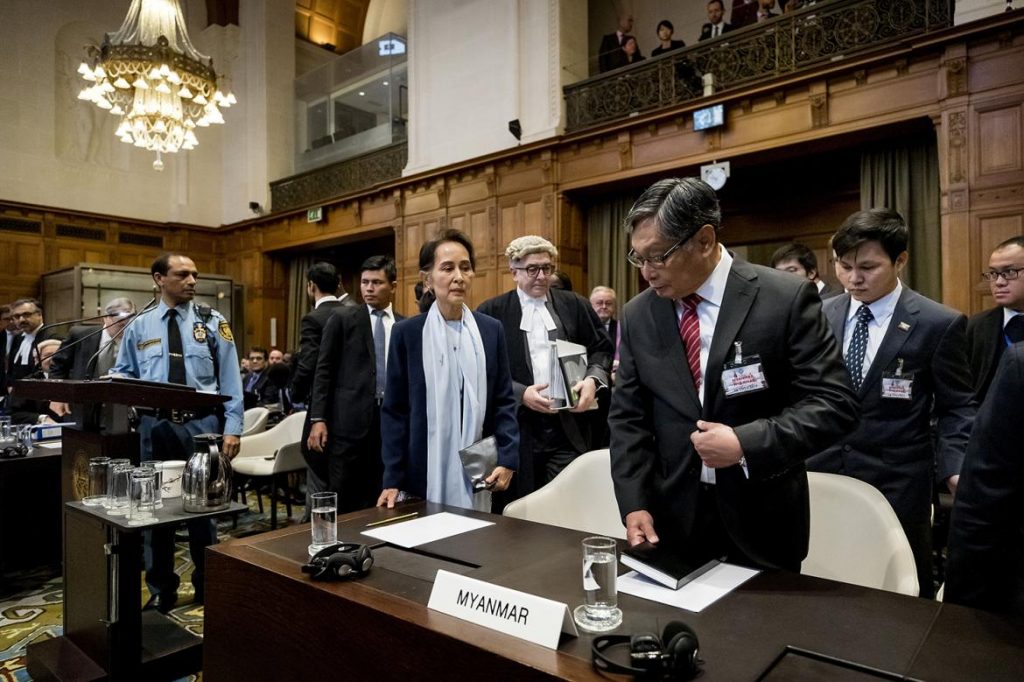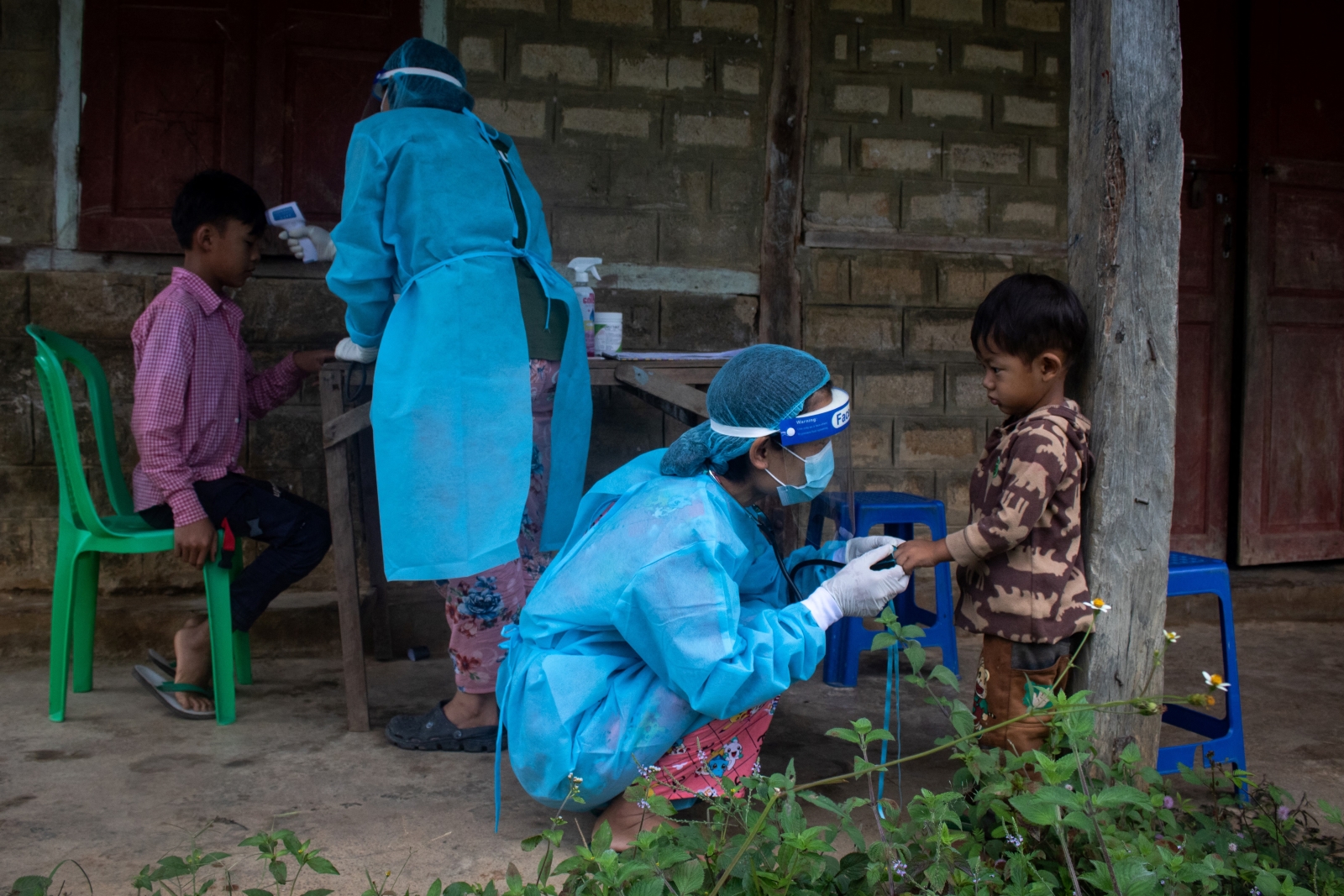By ANDREW NACHEMSON and NAW BETTY HAN | FRONTIER
YANGON — After weeks of anticipation, State Counsellor Daw Aung San Suu Kyi took the stand at the International Court of Justice yesterday to deny accusations that Myanmar committed genocide against the Rohingya.
“Regrettably, The Gambia has placed before the court an incomplete and misleading factual picture of the situation in Rakhine State in Myanmar,” she said.
The Gambia had opened proceedings Tuesday with testimony mostly reliant on information gleaned from an investigation by the United Nations Independent International Fact Finding Mission on Myanmar into alleged mass human rights abuses in Rakhine State.
The Muslim majority African country brought a dispute against Myanmar at the ICJ in November for allegedly violating the Genocide Convention on behalf of the Organisation of Islamic Cooperation.
Support more independent journalism like this. Sign up to be a Frontier member.
The Gambia’s attorney general, Mr Abubacarr Tambadou, began proceedings on Tuesday with an emotional appeal to Aung San Suu Kyi. “Today the Republic of The Gambia is asking you to inspire that same hope that you have given to generations, to the Rohingya in Myanmar, to hear their cries of genocide and their cries for help,” he said.
A Nobel Peace Prize Laureate and former darling of the international community, yesterday Aung San Suu Kyi found herself defending allegations of mass murder carried out by the Tatmadaw, her long-term adversary.
She opened her remarks by recognising the “utmost gravity” of genocide accusations, and in a preview of arguments to come, noted that it was not applied by the ICJ to the former Yugoslavia over the displacement in 1999 of one million residents of Kosovo.
Eight female Nobel Prize Winners issued a joint statement on Monday urging Aung San Suu Kyi “to publicly acknowledge the crimes, including genocide, committed against the Rohingya,” but this was not to be. For the most part, she repeated the Myanmar government line, rarely deviating from what she had said in the past.
She claimed the situation was too “complex” for the international community to understand, with violence perpetuated by many different actors. She argued that the conflict was instigated by an extremist group, the Arakan Rohingya Salvation Army, and that the military’s response was a legitimate operation. Lastly, she said rights violations – if they occurred – were committed by rogue soldiers and were not Tatmadaw policy.
Myanmar was already conducting its own internal investigations and pledged to hold those responsible accountable, she continued.
“Can there be genocidal intent on the part of a state that actively investigates, prosecutes, and punishes officers and soldiers who are accused of wrongdoing?” she asked, although many observers have found Myanmar’s progress on this issue severely lacking.
An inquiry conducted by Myanmar in October 2016, after an initial round of violence against the Rohingya, said it found “no evidence” of crimes against humanity and ethnic cleansing. The military has cleared itself of wrongdoing and an independent commission of enquiry appointed by the government in June 2018 is widely seen as ineffectual.
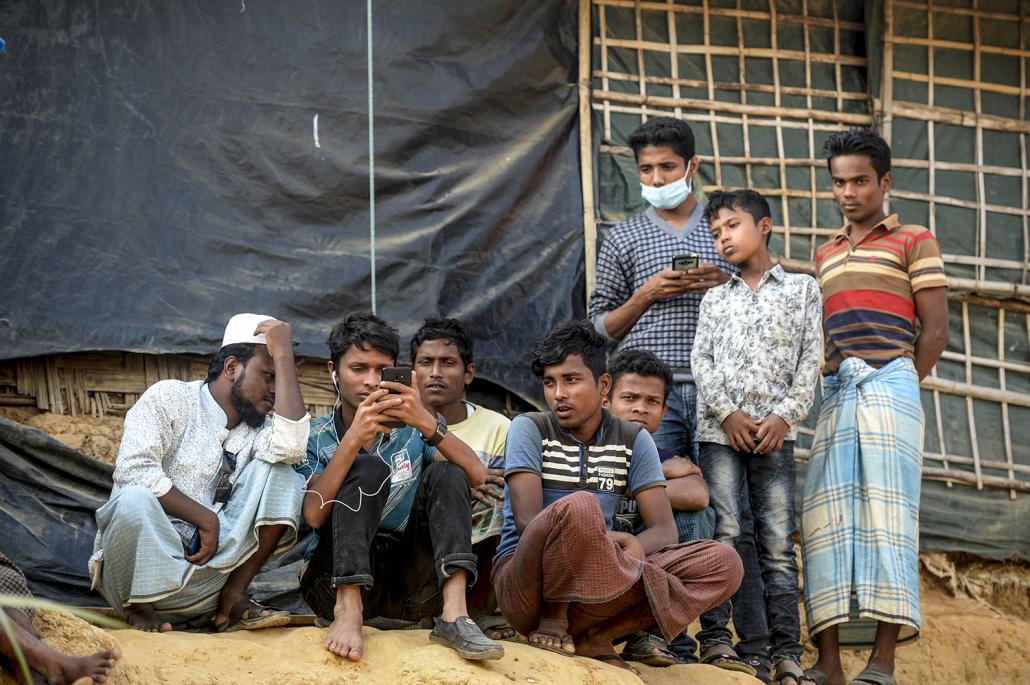
Rohingya refugees watch on a mobile phone a live feed of State Counsellor Aung San Suu Kyi’s appearance at the UN’s International Court of Justice, in a refugee camp in Cox’s Bazar, Bangladesh. (AFP)
Provisional measures
Consistent in The Gambia’s message was the argument that further genocidal acts are still being committed, or may be committed in the future, and that immediate action is necessary to prevent such violations.
The most forceful condemnations on Tuesday came from American lawyer Mr Paul Reichler, who specifically called out Aung San Suu Kyi.
“The military backed by Aung San Suu Kyi has responded with defiance and with the immediate threat of further atrocities present, more must urgently be done to prevent further tragedy,” he said, quoting Ms Yanghee Lee, the Special Rapporteur on Myanmar, adding that “they are all in it together.”
Reichler said the adoption of The Gambia’s provisional measures is necessary immediately to end the alleged genocide which he claims “is happening still”.
“Of course Myanmar denies this, as have all the perpetrators of genocide throughout history,” he said.
The provisional measures demand that Myanmar take action to prevent further genocide, not destroy any evidence related to previous acts of genocide, take no action to “aggravate” the existing dispute, and file a report at the end of four months on the efforts made to complete these demands.
Dr Emma Palmer, who teaches international law at Griffith University Law School in Australia, explained to Frontier in an email that this is only a preliminary stage.
“The ICJ only needs to determine whether provisional measures should be awarded. It is not yet deciding upon the merits of the actual substantive arguments about breaching the Genocide Convention,” she said, adding that The Gambia’s arguments were “quite strong at this stage of the proceedings”.
If the provisional measures are approved, the decision is binding, but the ICJ has little authority to enforce its rulings. If Myanmar fails to act on these measures, the case is referred to the UN Security Council, where China is likely to shield Myanmar from any further action.
Within Myanmar there has been much confusion about the provisional measures and the trial in general, even among those who have turned out to support Aung San Suu Kyi.
Mass rallies have been held since The Gambia first filed the complaint last month. On Tuesday in Yangon, thousands marched in the streets before gathering at Maha Bandoola Park outside City Hall. The area was awash with red as supporters waved Myanmar flags, carried posters featuring Daw Aung San Suu Kyi’s portrait, and wore shirts declaring their support for her.
However, many admitted to not fully understanding how the proceedings worked or what was at stake. Some also expressed dismay that they would not be able to follow the livestream because it would not be translated into the Myanmar language.
One Yangon-based student in the crowd told Frontier that his school gave him the day off to participate in the rally. Another said that she and her friends feared sanctions would return if the ICJ ruled against Myanmar and could impact scholarship opportunities. No such measures can be imposed by the ICJ.
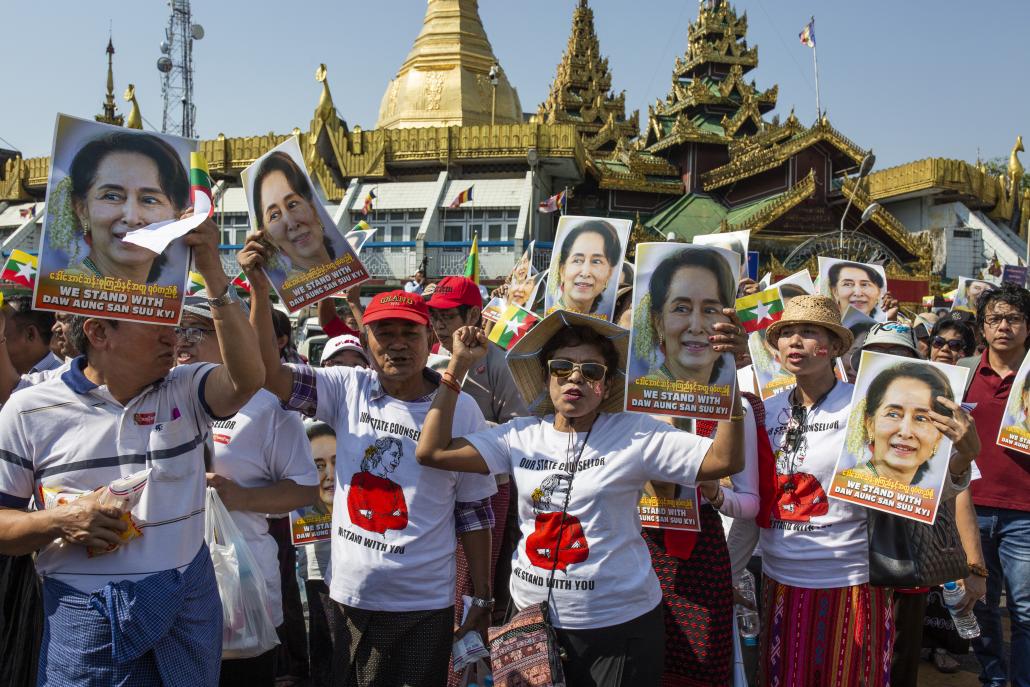
On Tuesday in Yangon, thousands marched in the streets before gathering at Maha Bandoola Park outside City Hall. (Hkun Lat | Frontier)
Confronted with grim testimony
At the ICJ on Tuesday, Aung San Suu Kyi listened to three hours of sometimes grim testimony on the alleged atrocities committed by the Tatmadaw against the Rohingya.
“They stabbed and kicked my stomach with my boots and then stripped me naked. I was blindfolded and then hung by my wrists from a tree. I was raped nine times. My mother found me in the evening. My unborn baby died,” a Rohingya survivor was quoted as saying, in just one example of the harrowing testimony read before the court.
Some observers on Twitter wondered if it was the first time that Aung San Suu Kyi had heard such accusations in detail. Mr Mark Farmaner, director of Burma Campaign UK, a human rights group, said he once tried to approach her about similar rights abuses documented against the Kachin people in 2012.
“She cut me off saying they were all as bad as each other and she’d heard reports that the [Kachin Independence Army] were also committing human rights violations. She would not accept there was no equivalence in the scale and severity of what the Burmese military are doing,” he wrote in an email to Frontier.
Farmaner said that Aung San Suu Kyi similarly “refused point blank” to visit Rohingya people in camps in Rakhine and listen to their experiences.
“You have to wonder if being forced to listen to the evidence for the first time will cause Aung San Suu Kyi to have private moments of doubt, but she is driven by her own prejudice and is incredibly stubborn,” Farmaner said.
Perhaps one of the most uncomfortable moments for Aung San Suu Kyi at the ICJ on Tuesday was when The Gambia’s legal team displayed a photograph from the Myanmar State Counsellor’s Office Facebook page, which read “FAKE RAPE”. The post, published in 2016, was still on the page at press time.
“What might have seemed acceptable in a government environment where she has surrounded herself with racist sycophants doesn’t look so good in the cold light of day in an international court,” Farmaner said.
Myanmar has been roundly criticised for hateful rhetoric against the Rohingya that has drummed up popular support within the country for the alleged attacks. The Gambia raised this up on Tuesday, but Aung San Suu Kyi countered it when she took the stand with her own thoughts on “hate narratives”, claiming that the accusations before the court were as dangerous as hate speech for disrupting unity in the country.
“Feeding the flames of extreme polarization in the context of Rakhine for example can harm the values of peace and harmony in Myanmar. Aggravating the wounds of conflict can undermine unity in Rakhine. Hate narratives are not simply confined to hate speech. Language that contributes to extreme polarization also amounts to hate narratives,” she said.
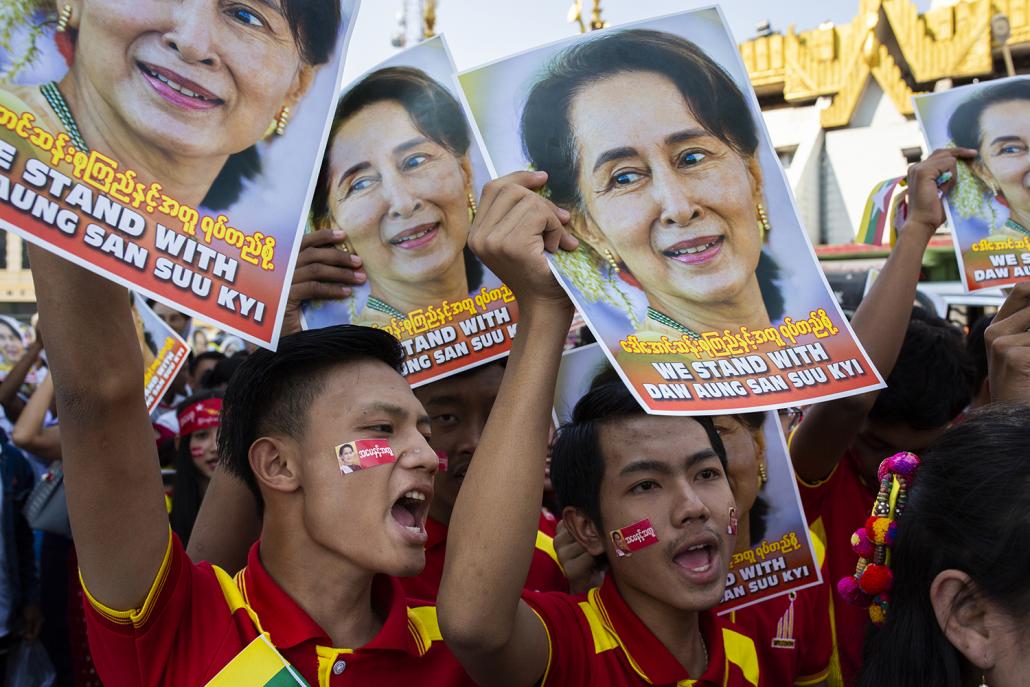
Those at the rally on Tuesday had already made up their mind to support Aung San Suu Kyi, no matter what. (Hkun Lat | Frontier)
The legality of it all
After Aung San Suu Kyi completed her statement, Mr William Schabas, a renowned expert on international law, took the stand. Schabas is known for his arguments in favour of the narrow application of genocide on the basis that the term is overused. However, even Schabas admitted in an Al Jazeera documentary on the Rohingya crisis in 2013 that genocide might be applicable to the treatment of the Rohingya.
But on Wednesday, as a representative of Myanmar, he argued just the opposite. Steeping his arguments in legal precedent, Schabas said that The Gambia presented “allegations that simply cannot meet the terms of the [Genocide] Convention”. He cited the dispute between Croatia and Serbia, where the ICJ ruled that forced displacement can be labelled as “ethnic cleansing” but not genocide.
But Palmer countered that just because forced deportation occurred, doesn’t mean genocide did not also occur.
The UN Fact Finding Mission says in its report that an estimate by Médecins Sans Frontières that some 10,000 Rohingya lost their lives in August and September 2017 was “conservative”.
More than 740,000 Rohingya are estimated to have fled Rakhine State into neighbouring Bangladesh during the same period, taking the total refugee population in Cox’s Bazar to over 900,000, and leaving about 600,000 Rohingya in Myanmar.
The relatively low proportion of deaths, Schabas said, might “suggest something other than an attempt to physically destroy the group.”
Again, he referred to case precedent, when the ICJ said it was “relevant to compare the size of the targeted” group with the total number of victims in the dispute between Croatia and Serbia. The ICJ ruled then that 12,500 Croat deaths was “small in relation to the size of the targeted part of the group” and therefore the court could not establish intent to destroy the group.
Palmer said she was not particularly convinced by Schabas’s argument regarding the number of deaths. She said that The Gambia did not need to conclusively prove genocidal intent “at this [preliminary] stage of ICJ proceedings” and noted that acts other than killing can constitute genocide.
Schabas was followed by Mr Christopher Staker, who argued that the complaint filed by The Gambia was illegitimate. He said The Gambia acted as a representative of an organisation – the OIC – a move he claimed was “unprecedented”.
“Only states may be parties in cases before the court,” he said, claiming The Gambia was attempting to “circumvent” this restriction. He also argued that for The Gambia to bring a dispute against Myanmar, it must be directly affected.
Palmer said Staker’s arguments were “stronger on their face, but I am not sure that the Court will ultimately find them convincing.”
“Myanmar attempted to build an argument that it was somehow “really” the OIC that brought the case, but this undermines The Gambia’s sovereignty as it implies that it acted only as some kind of empty channel for the OIC, rather than as a sovereign state,” she wrote.
Palmer added that there have been “other cases where states have brought cases to the ICJ where they were not directly affected except as parties to the same international treaty” or in defence of universal rights. For example, the court unanimously accepted an Australian lawsuit against Japan, over accusations that Japan was in violation of the 1946 International Convention for the Regulation of Whaling.
Myanmar’s legal team did not touch on well-documented allegations of sexual assault, despite The Gambia’s frequent reference to them.
“International criminal tribunals have found that sexual violence including rape can constitute genocide, as the Gambia has argued in this case, and this will come up again at the merits stage,” Palmer said.
Myanmar’s arguments did little to convince human rights activists, including Mr John Quinley of Fortify Rights.
“The ICJ should urgently put in place provisional measures to end ongoing crimes against the Rohingya,” he said to Frontier. It was “telling” that Aung San Suu Kyi avoided using the term Rohingya during the trial, he said, except in reference to ARSA.
“We have recently documented how the Myanmar authorities are continuing to deny the existence of Rohingya and their right to a nationality. Aung San Suu Kyi continues to deny and omit the ongoing genocidal conditions in Rakhine State,” he said.
But those at the rally on Tuesday had already made up their mind to support Aung San Suu Kyi, no matter what. U Aung Tun Tint, 45, travelled to downtown Yangon from Thanlyin Township with 400 other supporters who found out about the rally from a Facebook event.
“In my opinion, she is the future of our country because she always stands up for our nation. I don’t understand what the ICJ is, where The Gambia is, or the trial process,” he said. “I won’t understand the livestream of the court hearing. However, I trust her and I will forever stand with her as she is our only leader.”
Daw Hla Hla Aye, a 52-year-old member of the National League for Democracy, said she hoped “Mother Suu would win in the ICJ”.
“She stands for the dignity of our nation and we stand with her,” she said,


